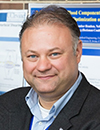|
Please See Details of Agenda in the Innovations of Microfluidics Track for Morning of May 7, 2024 |
| |
12:50 |  | Conference Chair Welcome and Introduction by Conference Chairperson
Sunitha Nagrath, Professor of Chemical Engineering and Biomedical Engineering, University of Michigan-Ann Arbor, United States of America
|
|
13:00 |  | Keynote Presentation Taking a Liquid Biopsy from Lab to Clinic: What It Takes to Get Ready for Prime Time
Daniel Hayes, Stuart B. Padnos Professor of Breast Cancer Research, University of Michigan Rogel Cancer Center, United States of America
A tumor biomarker liquid biopsy test, is not just an assay for circulating proteins, tumor cells, or cell free DNA. Rather, it is a precisely developed assay that has high analytical validity and clinical utility for a specific use context. Clinical utility requires consideration of several factors and the generation of high levels of evidence that use of the assay, compared to not having the results at all, improves patient outcomes – preferably either quality or quantity of life. These issues will be discussed in the presentation. |
|
13:30 |  | Keynote Presentation Whole Blood Microfluidics
Ian Papautsky, Richard and Loan Hill Professor of Bioengineering, Co-Director, NSF Center for Advanced Design & Manufacturing of Integrated Microfluidics, University of Illinois at Chicago, United States of America
Microfluidic devices based on inertial microfluidics have attracted considerable attention for applications in blood fractionation and liquid biopsy due to their label-free nature. However, these devices can be complex, deliver limited throughput, and rely on sample dilution, making them challenging to deploy as routinely used tools. We are developing platforms capable of label-free separation from unmodified whole blood to rapidly fractionate blood cells or screen rare cell populations, for downstream analysis or drug screening. |
|
14:00 |  | Keynote Presentation The Next Big Small Things: Technology Driven Approaches to Bring Extracellular Vesicles into the Clinic
Sunitha Nagrath, Professor of Chemical Engineering and Biomedical Engineering, University of Michigan-Ann Arbor, United States of America
Small nanoscale extracellular vesicles (EVs), known as exosomes, represent a rapidly emerging biomarker for cancer detection by liquid biopsy. Given the tiny amount of cargo carried by these nano-sized vesicles, the development of techniques that can analyze these important carriers is an active area of research in recent times. Additionally, while high in information content, the current exosomes profiling protocols are lengthy, preventing their widespread utilization and cancer diagnostics in a timely manner. Recent advances in technologies and approaches will be discussed to isolate and probe exosomes. We present the isolation of tumor derived EVs and their molecular cargo for rapid cancer diagnosis and in-depth mutation profiling. |
|
14:30 | Mid-Afternoon Coffee Break and Networking in the Exhibit Hall |


